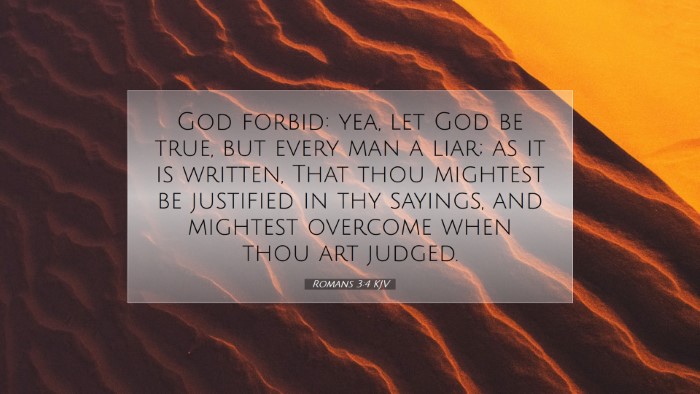Commentary on Romans 3:4
Verse: "God forbid: yea, let God be true, but every man a liar; as it is written, That thou mightest be justified in thy sayings, and mightest overcome when thou art judged." (Romans 3:4)
Introduction
The Apostle Paul, in Romans 3:4, addresses the fundamental question of God's faithfulness amidst human unfaithfulness. This verse serves not only as a profound theological statement but also as a practical reminder of the nature of divine truth contrasted with human deception. Commentary from prominent theologians such as Matthew Henry, Albert Barnes, and Adam Clarke provides rich insights into the implications of this verse.
The Unchangeable Nature of God
Divine Veracity: Paul begins with "God forbid," an emphatic negation of any thought that suggests God could be unfaithful or untrue. This reaction underscores the importance of retaining God's character as reliable and true. According to Matthew Henry, this establishes a premise: "whatever man may say, God remains constant in His truth." This truth is pivotal and should be the bedrock of a believer's faith.
Human Deception
Contrast with Humanity: In stark contrast, Paul states that "every man is a liar." Albert Barnes views this assertion as a recognition of human limitations and fallibility. It highlights the pervasive nature of sin and the difficulty of adhering to complete truth apart from God. Human lies reflect our moral depravity; we often fail to live up to the truth of God's standards. This notion warrants serious reflection, especially for those who lead within the church.
The Justification of God
Justified in His Sayings: The latter part of the verse, which cites the purpose of God’s truth—"that thou mightest be justified in thy sayings," reveals a significant theological truth. Adam Clarke interprets this as God being justified in His declarations, judgments, or prophecies. The God of the Scriptures is righteous, and His words are always validated by their outcomes. This speaks to the integrity of His promises and the certainty of His judgments.
Overcoming Judgment
God Overcoming Human Judgments: The phrase "and mightest overcome when thou art judged" implies that God's truth prevails over human accusations or judgments against Him. Matthew Henry notes, "God's truth will be vindicated, regardless of the judgments formed by men." This brings an assurance for believers that amidst human misunderstanding and misjudgment, God’s ultimate truth will illumine the darkness of fallibility and sin.
Theological Implications
- The Sovereignty of God: This verse exemplifies the sovereignty of God in the realm of truth. He is above all, and His declarations set the standard for truth.
- The Nature of Sin: It reveals that sin distorts truth, leading to deception. Paul’s assertion serves as a reminder of human frailty and the necessity for divine grace.
- Faithfulness of Believers: For those committed to God’s service, there is a call to reflect the integrity and fidelity of God's character in their words and actions.
Practical Application for Pastors and Leaders
As the church grapples with various moral and ethical dilemmas, the truth of Romans 3:4 should guide pastoral leadership. Integrity: Leaders should strive to embody God's truth, aware that their actions carry significant weight in leading others. Teaching Truth: In preaching and teaching, the emphasis should be placed on God's faithful nature. Reflection and Humility: It is critical to maintain a posture of humility, acknowledging our propensity toward fallibility while resting in the truth of God.
Conclusion
Romans 3:4 delivers a potent reminder that while human words may falter, the truth of God abides forever. In a world where truth is often subjective, believers are called to hold steadfast to the objective truth found in Scripture. The wisdom of theologians throughout history underscores the relevance of this verse, urging all—pastors, students, and scholars alike—to embrace and proclaim the steadfastness of God’s truth amidst an ever-changing landscape of human opinion.


